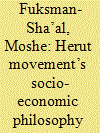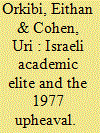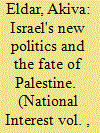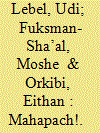|
|
|
Sort Order |
|
|
|
Items / Page
|
|
|
|
|
|
|
| Srl | Item |
| 1 |
ID:
154870


|
|
|
|
|
| Summary/Abstract |
This article seeks to add another dimension to the growing and extensive research on right-wing Zionism, by returning to an era when the Likud was first created. I will examine the major difference between processes that have led to the two key landmarks in the formative years of the Right in Israel: the establishment of Gahal in April 1965 and the founding of the Likud in August–September of 1973. While Gahal's establishment was a product of a prolonged, determined, patient and conscious effort on the part of Menachem Begin, the establishment of the Likud was, to a considerable degree, forced upon him. Those who were interested in expanding Gahal and creating an alignment of centre-right parties were actually the factors outside Herut, while Herut's more veteran leadership disapproved of these attempts. Within the Herut Movement, the voices that called for the creation of a broad political alignment were those that came from Herut's ‘internal opposition’, which revolved around Ezer Weizman. The article analyses the reasons behind Begin's reservations about a continued right-wing merger, examines the negotiation process and sheds light on the oscillation in Menachem Begin's ideology and politics between the fundamental and the pragmatic poles.
|
|
|
|
|
|
|
|
|
|
|
|
|
|
|
|
| 2 |
ID:
163290


|
|
|
|
|
| Summary/Abstract |
This article examines the Herut movement’s social and economic alternative to the ruling Mapai party, characterised by a liberal-individualistic outlook and a general vision of converting the centralised economy to an economy in which private initiative and competition dominate. On 17 May 1977 the Herut movement became the ruling party through its Likud electoral bloc, with economic reforms quickly following. These reforms encountered difficulties: the declared ‘economic turnabout’ harmed the strength of the economy. Inflation rates reaching several hundred per cent, frequent devaluations, and a loss of faith in the Israeli currency threatened stability. Nevertheless, from the social perspective, Herut did indeed succeed in bettering the conditions of its loyal voters in the development towns and distressed neighbourhoods.
|
|
|
|
|
|
|
|
|
|
|
|
|
|
|
|
| 3 |
ID:
163292


|
|
|
|
|
| Summary/Abstract |
This article analyses the reactions of Israel’s academic elite to the 1977 political upheaval. Some of Israel’s leading scholars in humanities and social sciences framed the new political situation as a grave ideological and moral crisis, reflecting the triumph of fundamentalist, nationalist, emotional and messianic trends over the rational, moderate, responsible political tradition that they had favoured and claimed to represent. The political change triggered a heated debate about the role of intellectuals in the ideological rehabilitation of the Labour party, as well as on the critical function of universities in the political arena. In the wake of what it perceived as a sharp deviation from the proper development of the traditional Zionist programme, the academic elite came to be perceived, in its own eyes as well as those of the public, as a faithful representative of the ‘old regime’, as an opponent to the new governmental elite and, for the first time, as an ideological opposition to Israel’s political hegemony.
|
|
|
|
|
|
|
|
|
|
|
|
|
|
|
|
| 4 |
ID:
123633


|
|
|
|
|
| Publication |
2012.
|
| Summary/Abstract |
SEEMINGLY, IT was a historic moment. The prime minister of Israel and leader of the Likud Party publicly embraced the two-state solution. A short while into his second term in office, ten days after the newly inaugurated president of the United States promised in Cairo to "personally pursue this outcome," Netanyahu declared an about-face, shifting from the traditional course he and his political camp had once pursued.
|
|
|
|
|
|
|
|
|
|
|
|
|
|
|
|
| 5 |
ID:
163283


|
|
|
|
|
|
|
|